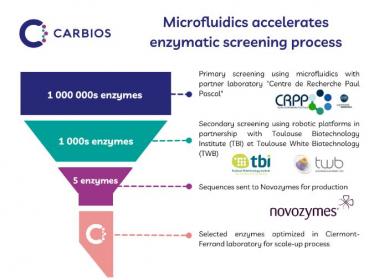Carbios accelerates enzyme optimization
- Carbios has developed an ultra-high throughput microfluidic screening of PET-depolymerizing enzymes in partnership with the Paul Pascal Research Center[1], a joint research unit of the CNRS[2] and the University of Bordeaux
- Microfluidics enables millions of enzymes to be screened in a day, compared with a few thousand a week with conventional technologies
- Future polymers of interest will benefit from this acceleration of the R&D phase, enabling Carbios to develop its portfolio of innovations on different types of plastic more rapidly
Carbios has accelerated its enzyme screening process with a microfluidic technology developed in partnership with the Paul Pascal Research Centre (a joint research unit of the CNRS and the University of Bordeaux, which specializes in microfluidics). This technology enables the screening of millions of enzymes in just one day, speeding up the process to optimize enzymes breaking down PET. This competitive advantage enables Carbios to reduce the time between the R&D phase and the production of its proprietary enzymes, and therefore to develop concrete solutions to plastic pollution even faster.
Microfluidics
Microfluidics allows the production of devices handling very small amounts of liquid. Each droplet generated can be considered as an independent microreactor having a volume in the picoliter range (10-12 liters) and containing a particular enzyme whose PET depolymerization activity will be screened. These droplets move through analysis units the size of a microchip allowing ultra-high throughput screening of 150 enzymes per second.
Previously, conventional robotic systems allowed screening in microplate format with a volume in the milliliter range (10-3 liters) and with rates of around one enzyme per minute.
The use of microfluidics to screen for more efficient or new enzymes will become widely adopted in the coming years, therefore accelerating the development of bioprocessing. Currently used by Carbios for the development of its PET depolymerization process, microfluidics should be used to accelerate the development of new enzymes for other types of plastic such as polyamide.
Carbios researchers specialized in microfluidics
Microfluidic processes require special expertise. At present, two researchers at Carbios are dedicated to microfluidics and based in the cooperative laboratory with TBI[3] hosted by INSA[4] Toulouse. Alexandra Tauzin, Researcher in Enzyme Engineering and Microfluidics, and Alexandre Gilles, Engineer specialized in robotics, work in partnership with the Paul Pascal Research Center.
[1] Centre de Recherche Paul Pascal (CRPP)
[2] Centre National de la Recherche Scientifique (CNRS) = National Center for Scientific Research
[3] Toulouse Biotechnology Institute
[4] National Institute of Applied Sciences



